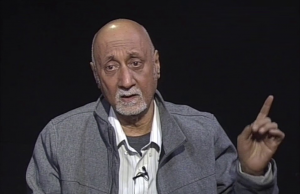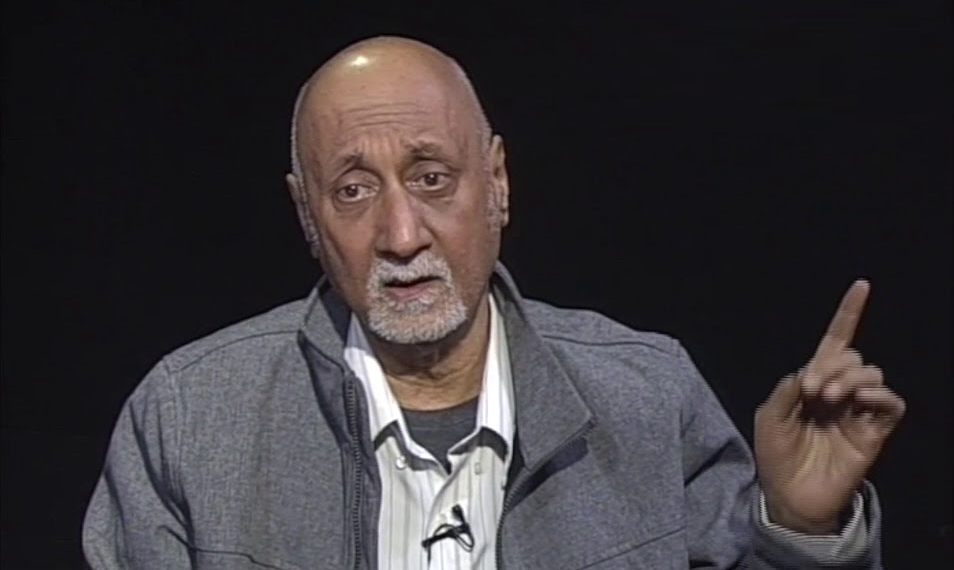Rise of Rightwing/Far-Right Authoritarianisms from Above and Below

By Achin Vanaik
Two Truths
Let us recognise that there are two basic truths that shape the existing world order. First, that we have and will continue to have for the foreseeable future the coexistence of a capitalist form of economic globalization and the multiple nation-states system. Second, that the principal form taken by authoritarian entities (states or movements) that have arisen throughout the world over the last few decades is authoritarian nationalism.
There is a connection between these two realities. While neoliberal globalization (understood as a general rightwards economic drift and not as a fixed ‘state of affairs’) is a transnational phenomenon, this can only be stabilised by right wing/far-right forces or governments having their own specific nationally-rooted politics and ideologies. There are thus both global and nationally specific factors that create the fertile ground for – but do not guarantee – the rise of authoritarian practices and populisms. If the main actors are national (states, parties, movements) nevertheless we can recognize cross-country common features requiring national, regional and more global strategies to counter and defeat these authoritarianisms.
The Factors
One of the key factors which has contributed to this rise of right wing and far-right authoritarianisms is the depredations, material and psychological, that has been caused by the ongoing processes of neoliberal globalization and the politics and ideological discourses accompanying it. Economically speaking, malnourishment and undernourishment continues to be the fate of over 1.5 billion of the world’s population. If we take into consideration unmet ‘basic needs’ concerning healthcare, decent education social security, leisure, decent housing and fair working hours and conditions of work, then one can add maybe a couple of billion or more of the world’s population to the earlier tally. At the same time this miserable state of affairs has seen dramatically rising inequalities of income, wealth and therefore of power. These have everywhere eroded substantive democracy even as procedurally speaking (e.g., elections, some civil liberties) has spread to some more countries of the South. Globalization has also led to much greater psychic destabilisation and greater clinging on to ‘unchangeable’ identities (ascription by birth) to cope with an increasing sense of powerlessness.
This process of neoliberal globalization then has created a huge set of ‘losers’ who have to a) be policed, hence erosion of democratic rights and freedoms; b) made to feel falsely empowered by diverting their anger and frustrations and mobilising them against the designated ‘enemy’ who is the scapegoat for supposedly causing, enhancing or benefitting from, their sufferings.
Another important factor associated with the process of neoliberal globalisation that must be taken note of is the Communications Revolution that has made TV and social media platforms (e.g., mobiles) the main mediums of public conversation between political persuaders and an increasingly atomised and individualised public audience. The result (a) is that the organisation of messaging including the generation of fake news and trolling rather than the quality of argumentation has become more and more important. (b) Political appeal for rightwing/far-right governments, parties, movements has become more ‘personalised’ and reliant on image projection and spectacle. This personalisation of politics has been enhanced by the fact of much greater policy convergence between the main parties contesting elections and striving for state power.
What is specific to rightwing populisms as distinct from leftwing populisms is the central role of scapegoating. All such entities require the cultivation and spreading of ideologies that embody exclusivist anti-democratic nationalisms and promote new forms of racism. Here Islamophobia has become the dominant (though not the only such) form and has grown within countries as well as spreading across them to become regional phenomena (deepening connections between reactionary Hindu and Buddhist groups in Myanmar, Sri Lanka, India) and even globally via the spread of the dishonest discourses and practices associated with the ‘Global War on Terror’ (GWOT).
Why this Islamophobia? Apart from India where this is foundational to Hindutva ideology, this is because: (a) there is the refusal to deal humanely with migration (particularly of Muslims), forced or voluntary, from many parts of the world. Forced migration will only grow to an even bigger scale in the future because of the guaranteed environmental consequences that will now follow from the climate carbonisation that has already occurred; (b) There is the long history of Western imperialism by US and allies in the MENA (Middle East and North Africa) region; (c) There is the self-serving hypocritical endorsement of GWOT by other big powers e.g., Russia, China, India facing secessionist pressures in Muslim dominated regions.
What Parliamentarians Can Jointly Do
Since this discussion is taking place in an AEPF meeting in Kuala Lumpur, Malaysia where parliamentarians are present from a number of countries in Asia and Europe there is here a set of issues which I believe demand the attention of the AEPF governments and specifically of the Asian member countries. These are listed below and if fulfilled will constitute important steps forward in the effort to reduce the power and influence of rightwing and far-right populisms in Asia and elsewhere.
- All Asian countries (the main holdouts) to sign and ratify the ‘International Convention and Protocol on the Status of Refugees’, and even otherwise to abide by its injunctions. Even for non-signatories, Refoulement (Forcible Repatriation) is illegal.
- Outright condemnation of Islamophobia and other forms of racism.
- Against hate speech especially by those holding parliamentary and senior government positions thereby having greater power and public influence.
- End all sanctions on Iran.
- Call on all Asian countries which have not signed and ratified (brought into force on their territories) the ‘International Convention Against Torture and Other Cruel, Inhuman or Degrading Treatment or Punishment’ to do so immediately. These holdouts include India, Malaysia, North Korea.
- Call on all states to sign and ratify the Treaty on Prohibition of Nuclear Weapons (TPNW) and promote steps to (a) bring about a Northeast Asian Nuclear Weapons Free Zone; (b) extend the Bangkok Treaty (Southeast Asian Nuclear Weapons Free Zone) to incorporate Bangladesh; (c) encourage Nepal to emulate Mongolia by moving towards declaring itself a Single State Nuclear Weapons Free Zone (SSNWFZ). Representative bodies of parliamentarians from some Asian (and European) countries should visit Bangladesh and Nepal to pursue these efforts.
ANNEXURE
The Refugee Question
The following are the Asian (excluding Middle East) Country Participants in the Convention on Status of Refugees:
Afghanistan, Azerbaijan, Cambodia, China, Fiji, Japan, Kazakhstan, Kyrgyzatan, Papua New Guinea, Philippines, South Korea, Tajikistan, Timor-Leste, Turkmenistan.
Refugees shall
- abide by the national laws of the contracting states (Article 2)
The contracting states shall
- exempt refugees from reciprocity (Article 7): That means that the granting of a right to a refugee should not be subject to the granting of similar treatment by the refugee’s country of nationality, because refugees do not enjoy the protection of their home state.[17]
- be able to take provisional measures against a refugee if needed in the interest of essential national security (Article 9)
- respect a refugee’s personal status and the rights that come with it, particularly rights related to marriage (Article 12)
- provide free access to courts for refugees (Article 16)
- provide administrative assistance for refugees (Article 25)
- provide identity papers for refugees (Article 27)
- provide travel documents for refugees (Article 28)
- allow refugees to transfer their assets (Article 30)
- provide the possibility of assimilation and naturalization to refugees (Article 34)
- cooperate with the UNHCR (Article 35) in the exercise of its functions and to help UNHCR supervise the implementation of the provisions in the Convention.
- provide information on any national legislation they may adopt to ensure the application of the Convention (Article 36).
- settle disputes they may have with other contracting states at the International Court of Justice if not otherwise possible (Article 38)
The contracting states shall not
- discriminate against refugees (Article 3)
- take exceptional measures against a refugee solely on account of his or her nationality (Article 8)
- expect refugees to pay taxes and fiscal charges that are different to those of nationals (Article 29)
- impose penalties on refugees who entered illegally in search of asylum if they present themselves without delay (Article 31), which is commonly interpreted to mean that their unlawful entry and presence ought not to be prosecuted at all
- expel refugees (Article 32)
- forcibly return or “refoul”refugees to the country they’ve fled from (Article 33). It is widely accepted that the prohibition of forcible return is part of customary international law. This means that even States that are not party to the 1951 Refugee Convention must respect the principle of non-refoulement. Therefore, States are obligated under the Convention and under customary international law to respect the principle of non-refoulement. If and when this principle is threatened, UNHCR can respond by intervening with relevant authorities, and if it deems necessary, will inform the public.
Refugees shall be treated at least like nationals in relation to
- freedom to practice their religion (Article 4)
- the respect and protection of artistic rights and industrial property (Article 14)
- rationing (Article 20)
- elementary education (Article 22)
- public relief and assistance (Article 23)
- labour legislation and social security (Article 24)
Refugees shall be treated at least like other non-nationals in relation to
- movable and immovable property (Article 13)
- the right of association in unions or other associations (Article 15)
- wage-earning employment (Article 17)
- self-employment (Article 18)
- practice of the liberal professions (Article 19)
- housing (Article 21)
- education higher than elementary (Article 22)
- the right to free movement and free choice of residence within the country (Article 26)
The Question of Torture and Other Unacceptable Methods of State Behaviour
The following are the Asian (excluding Middle East) Country Participants in the Convention Against Torture and Other Cruel, Inhuman and Degrading Treatment or Punishment:
Afghanistan, Azerbaijan, Bangladesh, Cambodia, China, Fiji, Indonesia, Japan, Kazakhstan, Kyrgyzstan, Laos, Maldives, Mongolia, Nepal, Pakistan, Philippines, South Korea, Sri Lanka, Tajikistan, Thailand, Timor-Leste, Turkmenistan, Uzbekistan, Vietnam.
The International Treaty Prohibiting Nuclear Weapons
The following are the Asian Signatories to the Treaty on Prohibition of Nuclear Weapons:
Bangladesh, Cambodia, Fiji, Indonesia, Kazakhstan, Laos, Malaysia, Nepal, Philippines, Timor-Leste, Thailand, Vietnam. [Only the last two have so far also ratified the Treaty].



